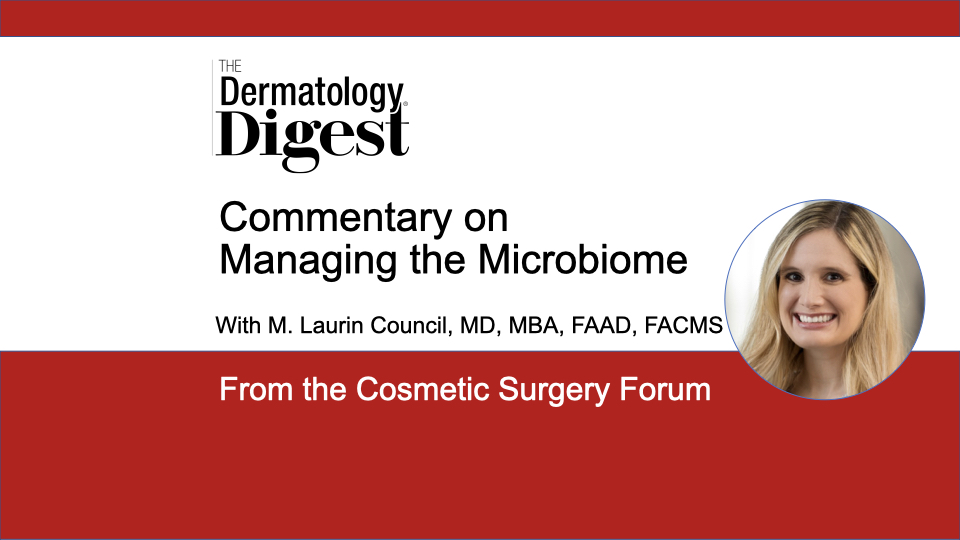Dr. Laurin Council discusses research suggesting a relationship between the microbiome and skin cancer, including how the microbiome can be oncogenic or tumor suppressive.
M. Laurin Council, MD, MBA, FAAD, FACMS, Professor of Dermatology, Washington University, St. Louis, Missouri
“At first you might think, what relationship would the microbiome have with skin cancer? Well, we know the strongest risk factors for skin cancer are things like fair skin and ultraviolet radiation, but it’s actually a lot more complex than that,” said M. Laurin Council, MD, MBA, FAAD, FACMS, who presented “Managing the Microbiome” at Cosmetic Surgery Forum in Nashville, Tennessee.
“The microbial ecosystem has been implemented in other cancers, things like Helicobacter pylori and gastric cancer, for example. It’s implemented in chronic inflammation, immune invasion, and carcinogenesis. So, maybe there is more to it.”
While 99% of the microbiome lies within the gut, there is also a microbiome within the skin, which interacts with the skin to promote nutrient absorption, support metabolism, and regulate immune function, said Dr. Council.
She cites studies in germ-free mice that were inoculated with Escherichia coli (E. coli) strains and that harbored certain kinases and were subsequently treated with carcinogens.
“Those mice all progressed to having colonic malignancies, whereas mice that were inoculated with E. colistrains without the particular kinases did not develop malignancies on exposure.”1
The findings translate to humans, said Dr. Council, citing another study in which 67% of colorectal patients were found to harbor specific E. coli with these kinases, compared to only 21% of healthy controls.2
“The effects of the microbiome can be either oncogenic or tumor suppressive.”3
In the studies that have compared gut flora changes in patients with melanoma in situ to invasive melanoma patients, researchers have seen a pattern of change as the disease becomes invasive,4 she said.
“To further confound things, in vitro studies have demonstrated tumor suppressive potential when certain cancer patients are treated with probiotic supplementation, and oncogenic effects when different bacteria are eliminated with antibiotics.5
When looking at the microbiome on the skin, certain bacteria have been found to have anti-inflammatory properties in ultraviolet radiation-induced inflammation, said Dr. Council.
“Staphylococcus aureus is more abundant in actinic keratoses and cutaneous squamous cell carcinoma. These lesions have been known to be devoid of commensal bacteria, and animal models have also shown that the bacterial composition in melanoma and in normal skin are significantly different.”
Another very interesting development in the relationship between the microbiome and cancer is the association with the oncogene BRAF, she said.
“We know that the characteristic BRAFv600e mutation is in roughly half of all melanomas. It’s also found in some colorectal carcinomas. Colorectal carcinomas with this mutation have a distinct microbiome.”6
It is not yet known if this translates to a specific signature on the skin or if it has clinical applications for treatment, said Dr. Council.
“What we do know is that multiple studies comparing the intestinal microbiome of responders with nonresponders have observed significant differences in the composition and diversity of gut flora. Fecal analysis studies have demonstrated that altered flora is correlated with a poor response and that probiotic supplementation and/or fecal transplants can restore the microbiome and enhance response to treatment.”
Yet another role that the microbiome plays in skin cancer patients is that it can affect the side effect profile from chemotherapy and radiation, probably because of an altered inflammatory response, said Dr. Council.
“Research into the microbiome and its association with skin cancer is in its infancy. The microbiome is definitely altered in a portion of patients. But we don’t know whether the cancers themselves alter the microbiome, or whether the microbiome is directly carcinogenic.”
References:
- Arthur JC, Perez-Chanona E, Mühlbauer M, et al. Intestinal inflammation targets cancer-inducing activity of the microbiota. Science. 2012 Oct 5;338(6103):120-3. doi: 10.1126/science.1224820. Epub 2012 Aug 16. PMID: 22903521; PMCID: PMC3645302.
- Buc E, Dubois D, Sauvanet P, et al. High prevalence of mucosa-associated E. coli producing cyclomodulin and genotoxin in colon cancer. PLoS One. 2013;8(2):e56964. doi: 10.1371/journal.pone.0056964. Epub 2013 Feb 14. PMID: 23457644; PMCID: PMC3572998.
- Makaranka S, Scutt F, Frixou M, et al. The gut microbiome and melanoma: A review. Exp Dermatol.2022 Sep;31(9):1292-1301. doi: 10.1111/exd.14639. Epub 2022 Jul 11. PMID: 35793428.
- Vitali F, Colucci R, Di Paola M, et al. Early melanoma invasivity correlates with gut fungal and bacterial profiles. Br J Dermatol. 2022 Jan;186(1):106-116. doi: 10.1111/bjd.20626. Epub 2021 Oct 10. PMID: 34227096; PMCID: PMC9293081.
- Elkrief A, Derosa L, Kroemer G, et al. The negative impact of antibiotics on outcomes in cancer patients treated with immunotherapy: a new independent prognostic factor? Ann Oncol. 2019 Oct 1;30(10):1572-1579. doi: 10.1093/annonc/mdz206. PMID: 31268133.
- Trivieri N, Pracella R, Cariglia MG, et al. BRAFV600E mutation impinges on gut microbial markers defining novel biomarkers for serrated colorectal cancer effective therapies. J Exp Clin Cancer Res. 2020 Dec 14;39(1):285. doi: 10.1186/s13046-020-01801-w. PMID: 33317591; PMCID: PMC7737386.


